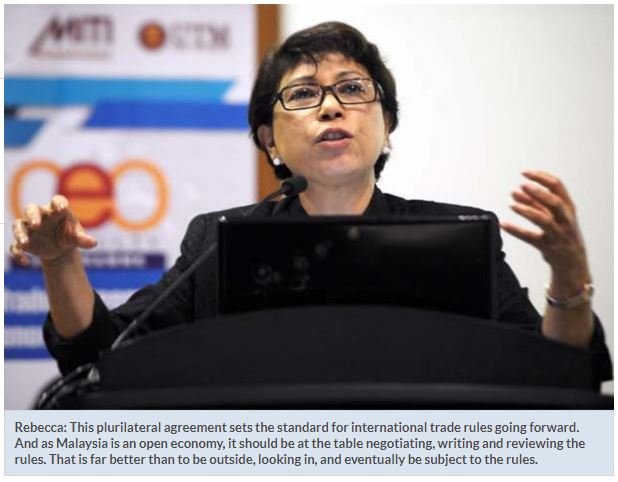Malaysia should ratify the CPTPP
DARREL Leiking has his plate full as he takes over the reins of the International Trade and Industry Ministry, reviewing trade and investment policies and making adjustments in line with regional and global developments.
And even as he ponders these developments there is the pressing question of whether or not Malaysia should ratify the Comprehensive and Progressive Agreement for the Trans-Pacific Partnership (CPTPP).
There is renewed questioning of the value of Malaysia’s participation in this agreement. Much is said about the reasons Malaysia should not ratify the agreement. There is, unfortunately, not enough about what Malaysia stands to lose from opting out.
This plurilateral agreement sets the standard for international trade rules going forward. And as Malaysia is an open economy, it should be at the table negotiating, writing and reviewing the rules. That is far better than to be outside, looking in, and eventually be subject to the rules.
The United States’ exit from the TPP is an opportunity for Malaysia and its partners to take the lead in rules-making in international trade.
Governance, transparency and predictability are key to national competitiveness. It follows that members of the CPTPP who have committed to rules and disciplines will be more attractive than those not in the CPTPP. Therefore, countries such as South Korea and Thailand have flagged their interest in joining the CPTPP.
What’s the difference between the Trans Pacific Partnership Agreement (TPPA) and the CPTPP besides the withdrawal of the US?
They are the same in spirit. But there are significant differences between the two, especially in the treatment of concerns that parties had in the TPPA.
The CPTPP addresses these concerns through “suspensions” of provisions. Of significance to Malaysia are those that deal with investment and intellectual property rights (IPR).
For investment, the main concern is about the right of businesses to sue governments (Investor State Dispute Settlement or ISDS). To be clear, the CPTPP, like the TPP, has strong safeguards to protect the government’s right to regulate in the public interest and prevent unwarranted claims.
In addition, in the CPTPP Investment Chapter, claims are not permitted in investment contracts and approvals. This means that under the CPTPP, private companies who enter into an investment contract with the government will not be able to use ISDS clauses if there is a dispute about that contract.
Similarly, in the Financial Services Chapter, there are provisions that further reduce the risk of ISDS claims against the government.
On IPR, the concerns include the price of medicines, extension of rights, and the coverage of IPR.
In Malaysia, pharmaceutical prices are, to a large extent, a function of procurement policies involving monopolies and not IPR alone. It must be stressed that the CPTPP does not affect Malaysia’s right to negotiate best prices for medicines.
The CPTPP is aligned with existing international rules on national treatment for intellectual property. Under this agreement, the term of protection for copyright stays at 50 years. The copyright term for films and sound recordings (including recorded music) expires 50 years after the end of the calendar year in which they were made or published.
The copyright term for books, screenplays, music, lyrics and artistic works expires 50 years after the end of the calendar year in which the author died.
In the CPTPP, there are no data or market protection obligations for new medicines, including biologics. Also, there is no requirement for any party to change data or market protection settings for new medicines, including small molecule medicines, biological medicines (medicines manufactured in, or derived from, a living system such as plant or animal cells) and medicines that contain a previously approved active ingredient.
Government procurement was another concern. The CPTPP establishes rules ensuring open, fair and transparent conditions of competition in the process.
Any negotiation to expand coverage of the government procurement chapter, particularly in relation to state or local government contracts, will be delayed. Parties will only initiate talks on this issue at least five years after the agreement becomes enforceable.
The CPTPP also affirms the importance of promoting not only corporate social responsibility, but cultural identity and diversity, environmental protection and conservation, gender equality, indigenous rights, labour rights, inclusive trade, sustainable development and traditional knowledge. These are the progressive elements in the CPTPP.
Contrary to what some believe, this agreement clearly embeds the right of government to regulate for public interest.
Given these improvements, Malaysia’s ratification of the CPTPP is not only important but imperative. It sends a message about our commitment to governance, transparency, predictability, rule of law and fair trade.
Tan Sri Rebecca Fatima Sta Maria was former secretary-general of the International Trade and Industry Ministry. She is currently senior policy fellow, Economic Research Institute for Asean and East Asia and chair of Institute for Democracy and Economic Affairs.
Source: https://www.thestar.com.my/business/business-news/2018/08/17/malaysia-should-ratify-the-cptpp/#jAVVzGsoZh5ouK2O.99


 English
English




